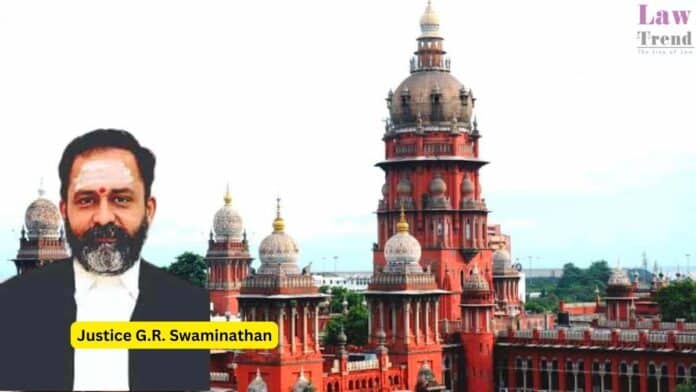A dramatic exchange unfolded in Courtroom No. 4 of the Madras High Court on Monday as Justice G.R. Swaminathan directly confronted Advocate Vanchinathan over a series of public allegations accusing the judge of caste and communal bias. The Bench, also comprising Justice K. Rajasekar, expressed strong displeasure at what it described as a prolonged and unfounded campaign to tarnish the judiciary’s reputation.
The hearing was convened to address social media posts and interviews in which Vanchinathan allegedly accused Justice Swaminathan of favouring certain communities in judicial matters and targeting others, particularly a Dalit senior advocate.
“You are a comedy piece,” Justice Swaminathan remarked during the hearing, further stating, “I don’t know who called you all revolutionary. You are all comedy pieces.”
These comments came after Vanchinathan refused to orally answer questions from the Bench and instead requested the Court to issue a written order.
Court Asserts Limits of Free Criticism
While acknowledging the legitimacy of critiquing judicial decisions, Justice Swaminathan underscored that accusations of caste bias cross the line into dangerous territory.
“Mr. Vanchinathan, I 100 per cent respect your right to brutally criticise my judgments. But when you are alleging caste bias, things take a different turn,” the judge observed.
Referring to one of the lawyer’s interviews, where he claimed that a Dalit senior counsel was being targeted by the Court while a Brahmin counterpart was allegedly spared, the judge noted that such sweeping and unverified remarks were serious and undermined public trust in the judiciary.
“For four years, you have been slandering me. I have not taken any action against you. We are also conscious of the rules of procedure. We are not fools. We will place the case before the Chief Justice or an appropriate bench. The whole ecosystem has ganged up—we are aware. We will not be intimidated or cowed down. Judicial independence is supreme,” Justice Swaminathan declared.
Clarification Sought, Not Contempt Proceedings
In its written order, the Court clarified that the present proceedings were not linked to any contempt action and were purely aimed at offering the advocate an opportunity to explain whether he stood by his public allegations.
The order recorded Vanchinathan’s appearance on July 25 and July 28 and noted his assertion that the Court’s actions were connected to his earlier complaint submitted to the Chief Justice of India and other Supreme Court judges—a claim the Bench firmly denied.
“We fail to understand on what basis such allegations have been made against this Court…We clarify once again that the proceedings against him have nothing to do with that complaint,” the order said.
“You have assumed two things that have no basis. First, this has nothing to do with the complaint you sent to the Hon’ble Chief Justice of India. Second, we have not initiated any contempt action till Friday. We only want to clarify your stance—whether you continue to allege caste and communal bias,” the Court stated.
Retired Judges Intervene; Court Expresses Displeasure
Adding another layer to the controversy, eight retired judges of the Madras High Court—including Justice K. Chandru, Justice D. Hariparanthaman, Justice S. Vimala, and Justice S.S. Sundar—wrote to the Chief Justice of India urging intervention. They contended that grievances regarding judicial conduct must be addressed through institutional mechanisms, not by the individual judges concerned.
Reacting to the development, the Court remarked:
“While this matter is pending, it is most unfortunate that some retired judges are rendering opinions.”
Justice Swaminathan also expressed personal disappointment over the involvement of Justice S.S. Sundar in the letter, noting his regret.
Matter Referred to Chief Justice
Concluding the hearing, the Bench ordered that the matter be placed before the Chief Justice of the Madras High Court for further orders. As the proceedings came to an end, Justice Swaminathan remarked:
“I regretted calling you a coward. Now I do not regret at all.”
The incident has stirred debate within legal circles, spotlighting the sensitive balance between judicial accountability, free expression, and institutional decorum.




